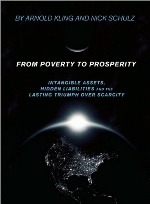Arnold Kling and Nick Schulz’s From Poverty to Prosperity: Intangible Assets, Hidden Liabilities and the Lasting Triumph over Scarcity.
I found it an exciting read, in part because I teach business ethics and philosophy of economics and I’m used to being immersed in the mainstream perspective, much of which I disagree with. So it was refreshing to find a kindred approach in Kling and Shulz’s economics that emphasizes:
* The foundational role of entrepreneurs, rather than seeing workers as performing pre-existing functions. (“Entrepreneurs are the heart of the economy, pumping innovation through the system.”)
* Consequently, starting one’s economic analysis with production, not welfarist distribution. (E.g., “although the supply of physical matter on earth is finite, the number of ways to re-arrange matter is infinite.”)
* Studying real human agents, not simplified abstractions that fit one’s models. (E.g., economists “should study economic history to give meat and sinews to the formal models that they’re studying, so that we do not become, God forbid, a branch of applied mathematics.”)
* Highlighting the importance of intangible resources and the knowledge economy, not simply the material resource economy. (E.g., “the average citizen in many advanced industrial nations has over $400,000 in intangible net worth.”)
* That plenty, not scarcity, is normal. (As the authors put it pithily: “To understand the plight of the workers a century ago, we’d read The Grapes of Wrath; to understand the plight of the workers today, we watch Supersize Me.”)
* That, consequently, win-win social relations are normal and the proper benchmark, not the usual expectation of zero-sum.
Kling and Schulz have put it together in a highly readable public intellectual book that draws upon and makes accessible the scholarly work of Douglass North, Robert Fogel, Joel Mokyr, Robert Solow, and Paul Romer.
The layout of the book is also intriguing and well done, alternating between explanatory essays on key economic themes and interviews with major economists: North, Fogel, Romer, Solow, Mokyr, along with William Easterly, Amar Bhide, William Lewis, William Baumol, and Edmund Phelps.
So get this book and learn about what the authors call Economics 2.0.

Pingback: Entrepreneur and Un-entrepreneur characteristics – Stephen Hicks, Ph.D. – Europeantech